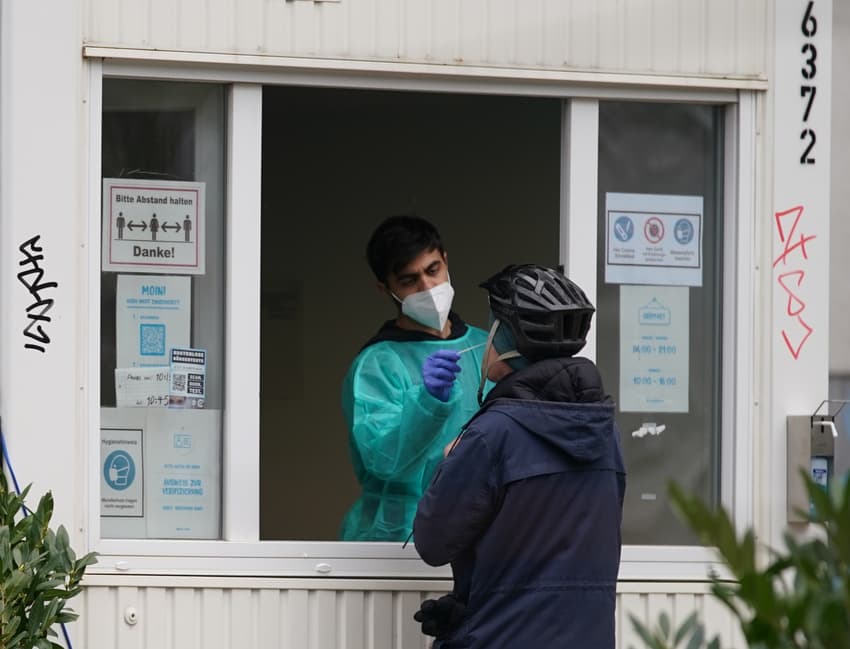Germany's Covid incidence reaches record high before measures are lifted

Germany is set to relax almost all Covid measures on March 20th, but infections are rising significantly again.
On Tuesday Germany's Robert Koch Institute (RKI) for disease control reported 1,585.4 Covid-19 infections per 100,000 people within seven days - the highest number since the start of the pandemic. On Monday, the 7-day incidence was 1543.0, and a week ago it was 1,293.6.
Health authorities reported 198,888 new coronavirus infections within the latest 24 hour period, nearly 42,000 more than the same day a week ago. Meanwhile, 238 people died in connection with Covid-19 within the last 24 hours, bringing the total number of deaths since the pandemic in Germany began to 125,873.
Experts believe a high number of cases are not being recorded in official data because health offices are struggling to trace all chains of infection.
Is Germany set to relax measures?
Yes. In February the German government and 16 states announced a three-step plan to phase out almost all Covid measures.
On Sunday, March 20th - the day after the current Infection Protection Act expires - far-reaching measures will be lifted.
A new law will see basic measures remain in place with a mechanism for states to bring in tougher rules if the situation calls for it. The Bundestag is to debate the draft legislation on Wednesday.
READ ALSO: EXPLAINED: Germany’s planned Covid strategy after ‘freedom day’
The German government says measures can be relaxed because the Omicron variant of Covid generally causes less severe illness than previous variants, and there is no longer a threat of the health system being overwhelmed
Protective measures - such as Covid health pass rules - will remain possible in so-called 'hotspots' with high numbers of infections.
The general obligation to wear a mask is to be partially dropped. It will, however, remain in nursing homes, hospitals and in local as well as long-distance public transport.
But politicians say rising infections mean the plans should be reconsidered.
The Standing Conference of the Ministers of Education and Cultural Affairs of the states (KMK), for instance, is calling for improvements to the Infection Protection Act for schools.
READ ALSO: Will Germany lift its Covid restrictions amid rising infections?
Karin Prien, education minister of Schleswig-Holstein, told the Funke Mediengruppe that states should be able to impose compulsory masks in schools even after March 20th - if necessary.
She said states would like to see the all restrictions lifted in schools by May at the latest. But at the moment a nationwide regulation for basic protection is necessary, "which also makes it possible to have compulsory masks and compulsory tests available as tools when needed", said Prien.
Comments (2)
See Also
On Tuesday Germany's Robert Koch Institute (RKI) for disease control reported 1,585.4 Covid-19 infections per 100,000 people within seven days - the highest number since the start of the pandemic. On Monday, the 7-day incidence was 1543.0, and a week ago it was 1,293.6.
Health authorities reported 198,888 new coronavirus infections within the latest 24 hour period, nearly 42,000 more than the same day a week ago. Meanwhile, 238 people died in connection with Covid-19 within the last 24 hours, bringing the total number of deaths since the pandemic in Germany began to 125,873.
Experts believe a high number of cases are not being recorded in official data because health offices are struggling to trace all chains of infection.
Is Germany set to relax measures?
Yes. In February the German government and 16 states announced a three-step plan to phase out almost all Covid measures.
On Sunday, March 20th - the day after the current Infection Protection Act expires - far-reaching measures will be lifted.
A new law will see basic measures remain in place with a mechanism for states to bring in tougher rules if the situation calls for it. The Bundestag is to debate the draft legislation on Wednesday.
READ ALSO: EXPLAINED: Germany’s planned Covid strategy after ‘freedom day’
The German government says measures can be relaxed because the Omicron variant of Covid generally causes less severe illness than previous variants, and there is no longer a threat of the health system being overwhelmed
Protective measures - such as Covid health pass rules - will remain possible in so-called 'hotspots' with high numbers of infections.
The general obligation to wear a mask is to be partially dropped. It will, however, remain in nursing homes, hospitals and in local as well as long-distance public transport.
But politicians say rising infections mean the plans should be reconsidered.
The Standing Conference of the Ministers of Education and Cultural Affairs of the states (KMK), for instance, is calling for improvements to the Infection Protection Act for schools.
READ ALSO: Will Germany lift its Covid restrictions amid rising infections?
Karin Prien, education minister of Schleswig-Holstein, told the Funke Mediengruppe that states should be able to impose compulsory masks in schools even after March 20th - if necessary.
She said states would like to see the all restrictions lifted in schools by May at the latest. But at the moment a nationwide regulation for basic protection is necessary, "which also makes it possible to have compulsory masks and compulsory tests available as tools when needed", said Prien.
Join the conversation in our comments section below. Share your own views and experience and if you have a question or suggestion for our journalists then email us at [email protected].
Please keep comments civil, constructive and on topic – and make sure to read our terms of use before getting involved.
Please log in here to leave a comment.